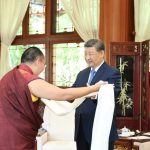United Front chief Li Ganjie’s message to faith groups follows Xi Jinping’s call to ‘Sinicise’ religion in meeting with Tibet’s Panchen Lama
The head of China’s United Front Work Department, the Communist Party body that oversees religious organisations, has warned faith groups to guard against “hidden dangers in the religious field and resolutely resist foreign infiltration”.
Li Ganjie visited a number of religious organisations this week to deliver the warning, state news agency Xinhua reported.
The Panchen Lama is the second-highest spiritual leader in Tibetan Buddhism, after the Dalai Lama. The incumbent was selected by Beijing in a controversial process that passed over the Dalai Lama’s chosen candidate.
The slew of Chinese leaders checking on religious matters comes just weeks before the Dalai Lama’s 90th birthday on July 6.
















